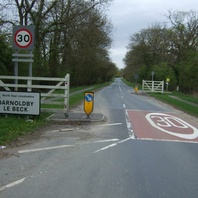
Viking Names
Barnoldby le Beck
Barnoldby le Beck, in the Haverstoe Wapentake of Lincolnshire, is a difficult name. The first element is likely from the Old Norse male personal name Bjǫrnúlfr, rather than the cognate Old English male personal name Beornwulf, especially taking into consideration the heavy Scandinavian influence in Lincolnshire. The second element is Old Norse by ‘a farmstead, a village’. The earliest reference to the Beck, from Old Norse bekkr ‘a stream, a beck’, is Barnoldby upon Becke 1662 Terrier.
Read More

Viking Names
Conisholme
Conisholme, in the South Riding of Lindsey in Lincolnshire, comes from Old Danish kunung ‘a king’ and Old Norse holmr ‘an island, an inland promontory, raised ground in marsh, a river-meadow’. The name is topographically appropriate, though what king is evoked by it is uncertain. However, the village of Coningsby, also in the South Riding of Lindsey, is recorded in Domesday Book as having been owned by the king.
Read More
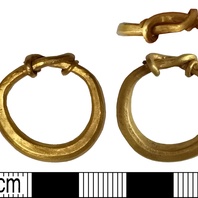
Viking Objects
Gold Finger Ring (DENO-F22E58)
This gold finger ring is made of a curved rod with a rectangular cross-section and bevelled edges. Rings like this with knotted ends are typically Scandinavian. Some examples of plain rings like this one were strung on bracelets in Scandinavia.
Read More

Viking Names
Perlethorpe
Perlethorpe, in the Bassetlaw Wapentake of Nottinghamshire, was originally a simplex name from the Old Norse element þorp ‘outlying farm, settlement’. The first element derives from the family name Peverel and was added at a later date possibly because the estate became associated with this family. Perlethorpe is a joint parish with Budby.
Read More

Viking Names
Cadeby
Cadeby, in the North Riding of Lindsey of Lincolnshire, comes from the Old Norse male name Káti and Old Norse bý ‘a farmstead, a village’ Cadeby is a joint parish with Wyham.
Read More
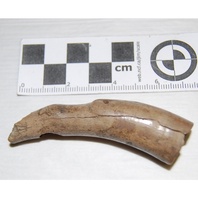
Viking Objects
Zoomorphic Knife Handle (L.A67.1864.2.0)
This bone knife handle was carved into the head of a dragon with the snout broken off. This handle is typical of the sorts of small knives that people carried for everyday use in the Viking Age. They would have been worn suspended from a belt or hung from a brooch. As general utility knives, they would have been used for everything from eating to trimming one’s nails.
Read More
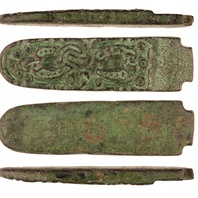
Viking Objects
Jellinge Style Die (LCNCC:1999.27)
This copper alloy metalworker’s die was used for manufacturing decorated pressblech foils. It features an intertwined zoomorphic design in the Jellinge style which was a popular Scandinavian style in the tenth century.
Read More
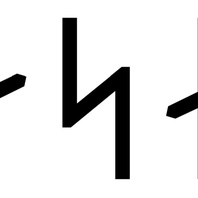
Viking Names
Asa
Ása was a common name throughout Scandinavia, including quite a few examples in Swedish and Danish runic inscriptions, but used fairly sparingly in Iceland. There are three examples in Domesday Book for Yorkshire. It is a short form for Old Norse names in Ás- from áss, óss ‘a god’.
Read More

Viking Names
Snip
The Old Norse byname Snípr may be related to Modern Norwegian snipa ‘miser, unsociable person’. A single instance is recorded in Norway in 1335. It is also the first element of the place-name Snibstone, Leicestershire.
Read More
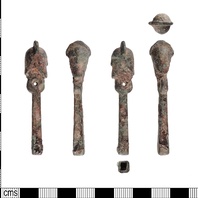
Viking Objects
Copper-Alloy Toilet Implement (LIN-756E6A)
This early medieval socketed anthropomorphic object possibly depicts the Norse god Odin, who wears a bird-headed helmet or headdress. This object belongs to a group of similar figurines, all with bird-headed helmets or headdresses, which have been found in England, Sweden, Gotland, Denmark, Russia, and Belgium. Evidence from cemeteries demonstrates this type of object is strongly associated with women, and is probably an import from Sweden dating to the later seventh century, demonstrating contacts with Scandinavia before the Viking Age. While the exact function of this object remains unclear, parallels suggest it is perhaps a toilet implement.
Read More
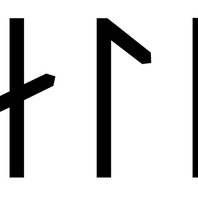
Viking Names
Ali/Alli
It is not possible to determine whether the names in Lincolnshire derive from Áli or Alli so all information for both names appears on this page. Áli is a diminutive name and occurs in Old West Scandinavia but it is not really frequent although it occurs as the first element of Norwegian place-names. It also appears in a few Danish place-names, but is not found in documents except for the Latin form Anulo. Alli is a short form of a compound name in Alf- or Al-. It does not occur independently in Old West Scandinavian but is found in a few Norwegian place-names. There are several instances in Old Danish including Latin Allo and a number of runic examples in both Denmark and Sweden. Áli or Alli is the first element of the place-names Aylesby, Althorpe, and Ailby in Lincolnshire.
